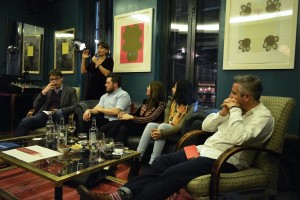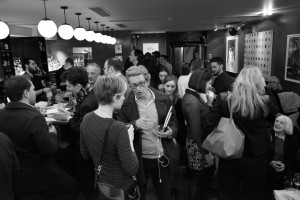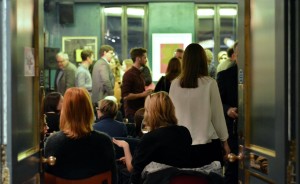Byte the Book: Clever Content
How writers are mastering all things digital to create new revenue streams.
Byte the Book – a membership organisation which aims to educate authors and publishers about technology and help them make connections across the publishing industry – recently held an event entitled ‘Clever Content’. Sponsored by ALCS, the event was designed to help writers think creatively about new ways to generate revenue for themselves.
The event was chaired by writer, philosopher and Oxford Internet Institute associate, Tom Chatfield, author ofHow to Thrive in the Digital Age and Live This Book.
The panellists were Crystal Mahey-Morgan, formerly of Penguin Random House, and now founder of OWN IT Entertainment Ltd, a storytelling lifestyle brand; Helen McGinn, author and founder of The Knackered Mothers’ Wine Club blog; Jamie Spafford, co-founder of Sorted Food; and Daniel Solomons, Head of Delivery at Google Digital Academy. Here are edited versions of the four creators’ stories.

Crystal Mahey-Morgan: OWN IT is not just about book publishing. It’s about finding stories and thinking about the best ways to tell those stories. A way for authors to find new revenue streams is to think about your work not as books, but as stories, and then think about the ways that you can communicate those stories and the audiences you can find. For example, I published Don’t be Alien which has a song and an animation within a multimedia book. We realised that if we packaged the product in different ways we could reach different audiences and therefore find different revenue streams. So you can buy the multimedia book with the song and the animation within it, but you can also buy the song separately. We also have T-shirts with six-word stories on them: a new literary platform, and another way to get your words into people’s lives and homes. It’s about thinking about the different ways that audiences consume entertainment and how your stories fit into that.
“Why would other people want to tap into your audience? The thing I love about the YouTube generation is they share audiences.”
Helen McGinn: I remember thinking to myself “Why didn’t I call myself ‘The Really Clever Wine Lady’?” but at least ‘The Knackered Mother’s Wine Club’ sticks! My blog was something that was born out of my love of wine and my need to stop watching so much bad telly. I was at home with young children and started the very simple formula of posting two wines a week on the blog to stop people calling me and texting me on a Friday afternoon from the aisles of Waitrose or Tesco or whatever, shouting “What do I buy?”. The book came from that, and made me realise I had a platform to continue to sell it from. The blog is now seven years old but the formula has stayed the same. But I have got smarter about talking to my audience, and asking them what else I can do on the blog to help them broaden their wine horizons. Hopefully that brings new people to the blog, and then they find the book. So it’s really about having a conversation with your audience.
Jamie Spafford: Sorted Food has 1.5 million subscribers and 180 million views, and is one of the most engaged cookery channels in the world. Six years ago it started with a group of friends around a pub table. We’d all known each other since school but it was only during the Christmas holidays in the pub talking about the silly things we were getting up to at university that we realised we had one thing in common: we were all eating absolute rubbish. We started to share recipes and a few tips, and we hit on ‘Sorted’ as a way of sharing those recipes with more people. We created a book and found some money from some friends and family to get it printed. We managed to sell a few copies, but it was really hard work. We were also talking to friends on Facebook and YouTube, and we started to put some of our cooking content up there. We very quickly found new audiences who wanted to talk back to us who were asking us to cook other dishes and were giving us their tips. And Sorted Food grew from there, and now 1.5 million people around the world are part of a gigantic cooking conversation. It’s grown into an incredible movement of people, and the content really has just been a conversation.
“We realised that if we packaged the product in different ways we could reach different audiences and therefore find different revenue streams.”
Daniel Solomons: With digital we’re doing the same thing we’ve always done. But there are two things that stand out. One is what David Bowie said about 10 years ago about the power having shifted from artist to audience. And we know a lot more about who the audiences are now, allowing us to find them in a more efficient way. Then when you’ve got them, the second part is exactly what Crystal said, it’s all about stories and storytelling. You want to try and have an impact on your audiences, nurture them and have a conversation with them. And you’ve got to recognise them. Can you imagine if you walked into a shop every morning on the way to the station and got the same paper and a packet of crisps, but every time you walked in there, they went: “Er…hello?” and asked you what you wanted. You’d expect to be recognised. It’s even more so in the digital realm. You want to feel like a returning customer, that you have some value to add. So I’m building data to have that conversation. Then the final thing we’ve always done, is try to measure the results: that’s the tricky bit. We need to think about it in two ways. There’s the value to you, as in, what can you sell them or what can you give them? And then there’s the value to others. Why would other people want to tap into your audience? The thing I love about the YouTube generation is they share audiences. They understand the value of putting audiences together and they all collaborate. So for me that’s the main thing. Find the right people, tell them the right stories, build that relationship with them.
Tom Chatfield: If you could give one piece of advice that someone who was thinking about clever content could carve above their screen or the back of their iPhone, what might it be?
“The book came from that, and made me realise I had a platform to continue to sell it from.”
Daniel: You’ve got to measure. You have to have some kind of analytics. There are simple analytics and there are complex ones. I don’t suggest that everyone dive into GA Premium. But there are a lot of things you can do, a lot of companies who will work with you. On the back of my iPhone? “Test and learn.”
Jamie: We had flipped the idea of a cooking show on its head, by having one run by people who didn’t know how to cook. Therefore we were having very natural conversations with the audience because we didn’t know any better than they did. The whole element of conversation came from going “This is our way, how can you make this better?” We found there was never one right answer. So for us it’s always been about never knowing more than we needed to as we always have people we can ask.
Helen: I think mine would have to be: “Be authentic.” I’ve been lucky enough to work in the wine industry for 20 years and I did 10 of them as a wine buyer for a supermarket, so I have travelled and I know a lot about wine. But what I really love is that you’ll never know everything about wine, there’s always more to try. That’s the fun part. I always try to make sure that I come back to being authentic to try and share my knowledge, but also being very open to trying new things.
Crystal: Look at your core content, and think about the way that you can diversify to bring that to market in new ways. Sorry to use buzzwords but discoverability is the key to conversations, to sales, to getting your content out there. If you diversify there are more ways for people to discover your content. I’ve got people who buy my T-shirts and as a result of that they buy my books.
Pictures from the event below.
Byte the Book standard membership is £99 a year or £30 a quarter. For more information on their events and joining up, see their website.
Throughout the year in ALCS News we’ll be hearing from a selection of writers and bloggers about how they have maximised their incomes by creating digital revenues.


